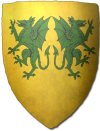The Kingdom of Logres

| Country | |
|
| |
| Information | |
|---|---|
| Continent: | Britain |
| Country: | Logres |
| Culture: | Cymric |
| Ruler: | None |
| Heir apparent: | None |
| Military power: | |
| Political power: | |
| Attitude: | |
| Coat-of-Arms | |
| Or, two dragons addorsed rampant vert | |

| |
Property "Name" (as page type) with input value "{{#replace:Logres||_}}" contains invalid characters or is incomplete and therefore can cause unexpected results during a query or annotation process.
Information
Logres is the kingdom of lowland Britain, encompassing about half of the total area of the island and most of the prime land for farming. It is currently ([[Timeline]] A.D.) divided into 10 counties, but it varies a lot depending upon the time period. The realm was named after the legendary king Locrinus, the oldest son of Brutus of Troy.
It is mostly home to the Cymric culture, and is in the early stages of feudalism.
Geography
Political
In the current year of [[Timeline]], Arthur's reign is just beginning. He is centralizing the power and many former counties has sworn Homage. The country is quickly expanding.
From the west, Cornwall is still in controll of Tintagel and Ascalon but the expanse into Logres is halted.
In the south and east the Saxons of several tribes are taking their opportunity with the lack of British king and are invading several of the border counties. Up north the northern king stems some of the Saxon tide but the northern counties are still having a hard time.
Main article, Political Map of Britain
Rulers
- First ruler - Locrinus
- 390 - 440: King Constantine the Just
- 440 - 444: King Constans the Child-king
- 444 - 463: King Vortigern the Usurper
- 463 - 466: Interregnum (Hengest)
- 466 - 480: High King Aurelius, the Last Roman
- 480 - 495: King Uther, the King of Warlords
- 495 - 509: Interregnum
- 510 - present: High King Arthur, King of Britain
History
The kingdom is old. Though the leadership of the ancient tribes lost their dominant political power to Rome, the people clung to their customary ways. The Romans left most tribal traditions and boundaries intact, as long as the peasants paid into the imperial system. When the imperial presence failed, Roman Britain continued briefly before collapsing as the people flocked to the warlords who actually protected them. Each ruler has changed things just a little, adapting ideals intoreality to form the kingdom. Now the kingdom’s Ancient Laws and Customs still hold sway, overlaid with the old Roman tax system, and adapted to support a militarized society run by warlords.
The old land of Logres is said to be named after Locrinus, first amongst the sons of Brutus himself. When Brutus died, the land was split amongst his son, his oldest son took the land he called Logres, the largest and most fertile land.
When the Romans came they conquered all of the lowlands, and when they departed the local tribes were left in command again. Throughout much of the island the local lords became independent kings, but here they continued to cooperate and maintain some unity. The eastern regions, once ruled by Saxons, reverted to their pagan beliefs.
Territories
The kingdom has a vast organization to administer. It is not a government, but an extension of the king’s household. Its purpose is to collect the king’s taxes.
Dukedoms
Several decades ago King Aurelius Ambrosius divided Logres into defense zones each with a dux militum (L. “leader of soldiers”) charged with fast local defense against raiders. Each duke can call local barons of the dukedom to form an army to repel invaders, but the barons are not his vassals. Thus, a dukedom is a military administrative unit, not a civil one. There were six dukedoms in Uther's time, but in anarchy the title means little.
Counties
The kingdom is divided into 24 administrative regions called counties. A county is a contiguous geographic area that is considerable, but variable, in size. A county is not a political unit. It is strictly an administrative territory, and encompasses everything within its borders. Rarely is anyone ever the lord of an entire county, holding just of parts of it, even if he has the title of count.
Each county has a royal castle that is held by the sheriff and used as a treasury, prison, supply storage, and mustering point for the local levy.
Towns have grown up beside each castle to handle subsidiary business, and these sites are usually called County Towns. Many of these have the same name as their territory.
The current counties of Logres:
- Berroc (Britain)
- Dorsette (Britain)
- Escavalon (Britain)
- Glevum (Britain)
- Huntland (Britain)
- Jagent (Britain)
- Lambor (Britain)
- Linden (Britain)
- Logres (Britain)
- Rydychan (Britain)
- Salisbury (Britain)
- Wuerensis (Britain)
Locations
Characters
Royal Forests
Forests are special hunting preserves for use by the king and some warlords. Some of them do not have many trees at all, so the term is a legal designation, not a physical description. Almost a quarter of Logres is forest, mostly royal but occasionally private. Within them the animals of the chase — red deer, fallow deer, roe deer, and boar — are protected. No one but the owner of the forest may take these animals; punishment for anyone else is blinding and castration.
Even knights and clerics, who are normally protected from common law, are punished the same way for violations. Foresters, verderers, and other officials are intent upon keeping the Law.